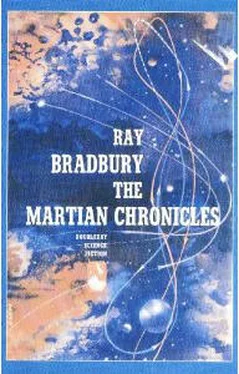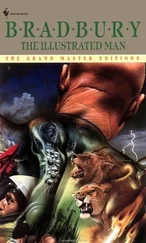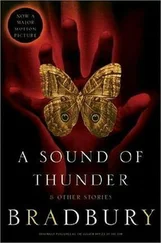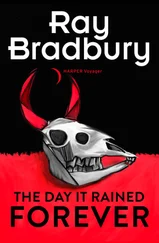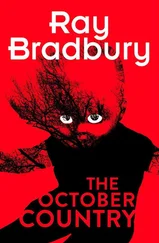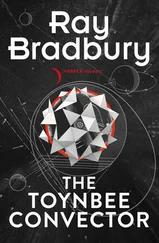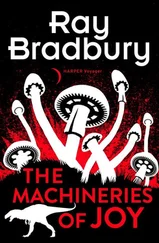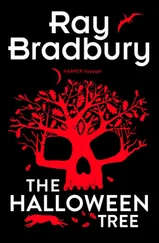“We won’t ruin Mars,” said the captain. “It’s too big and too good.”
“You think not? We Earth Men have a talent for ruining big, beautiful things. The only reason we didn’t set up hot-dog stands in the midst of the Egyptian temple of Karnak is because it was out of the way and served no large commercial purpose. And Egypt is a small part of Earth. But here, this whole thing is ancient and different, and we have to set down somewhere and start fouling it up. We’ll call the canal the Rockefeller Canal and the mountain King George Mountain and the sea the Dupont sea, and there’ll be Roosevelt and Lincoln and Coolidge cities and it won’t ever be right, when there are the proper names for these places.”
“That’ll be your job, as archaeologists, to find out the old names, and we’ll use them.”
“A few men like us against all the commercial interests.” Spender looked at the iron mountains. “ They know we’re here tonight, to spit in their wine, and I imagine they hate us.”
The captain shook his head. “There’s no hatred here.” He listened to the wind. “From the look of their cities they were a graceful, beautiful, and philosophical people. They accepted what came to them. They acceded to racial death, that much we know, and without a last-moment war of frustration to tumble down their cities. Every town we’ve seen so far has been flawlessly intact. They probably don’t mind us being here any more than they’d mind children playing on the lawn, knowing and understanding children for what they are. And, anyway, perhaps all this will change us for the better”.
“Did you notice the peculiar quiet of the men, Spender, until Biggs forced them to get happy? They looked pretty humble and frightened. Looking at all this, we know we’re not so hot; we’re kids in rompers, shouting with our play rockets and atoms, loud and alive. But one day Earth will be as Mars is today. This will sober us. It’s an object lesson in civilizations. We’ll learn from Mars. Now suck in your chin. Let’s go back and play happy. That fifty-dollar fine still goes.”
The party was not going too well. The wind kept coming in off the dead sea. It moved around the men and it moved around the captain and Jeff Spender as they returned to the group. The wind pulled at the dust and the shining rocket and pulled at the accordion, and the dust got into the vamped harmonica. The dust got in their eyes and the wind made a high singing sound in the air. As suddenly as it had come the wind died.
But the party had died too.
The men stood upright against the dark cold sky.
“Come on, gents, come on!” Biggs bounded from the ship in a fresh uniform, not looking at Spender even once. His voice was like someone in an empty auditorium. It was alone. “Come on!”
Nobody moved.
“Come on, Whitie, your harmonica!”
Whitie blew a chord. It sounded funny and wrong. Whitie knocked the moisture from his harmonica and put it away.
“What kinda party is this?” Biggs wanted to know.
Someone hugged the accordion. It gave a sound like a dying animal. That was all.
“Okay, me and my bottle will go have our own party.” Biggs squatted against the rocket, drinking from a flask.
Spender watched him. Spender did not move for a long time. Then his fingers crawled up along his trembling leg to his holstered pistol, very quietly, and stroked and tapped the leather sheath.
“All those who want to can come into the city with me,” announced the captain. “We’ll post a guard here at the rocket and go armed, just in case.”
The men counted off. Fourteen of them wanted to go, including Biggs, who laughingly counted himself in, waving his bottle. Six others stayed behind.
“Here we go!” Biggs shouted.
The party moved out into the moonlight, silently. They made their way to the outer rim of the dreaming dead city in the light of the racing twin moons. Their shadows, under them, were double shadows. They did not breathe, or seemed not to, perhaps, for several minutes. They were waiting for something to stir in the dead city, some gray form to rise, some ancient, ancestral shape to come galloping across the vacant sea bottom on an ancient, armored steel of impossible lineage, of unbelievable derivation.
Spender filled the streets with his eyes and his mind. People moved like blue vapor lights on the cobbled avenues, and there were faint murmurs of sound, and odd animals scurrying across the gray-red sands. Each window was given a person who leaned from it and waved slowly, as if under a timeless water, at some moving form in the fathoms of space below the moon-silvered towers. Music was played on some inner ear, and Spender imagined the shape of such instruments to evoke such music. The land was haunted.
“Hey!” shouted Biggs, standing tall, his hands around his open mouth. “Hey, you people in the city there, you!”
“Biggs!” said the captain.
Biggs quieted.
They walked forward on a tiled avenue. They were all whispering now, for it was like entering a vast open library or a mausoleum in which the wind lived and over which the stars shone. The captain spoke quietly. He wondered where the people had gone, and what they had been, and who their kings were, and how they had died. And he wondered, quietly aloud, how they had built this city to last the ages through, and had they ever come to Earth? Were they ancestors of Earth Men ten thousand years removed? And had they loved and hated similar loves and hates, and done similar silly things when silly things were done?
Nobody moved. The moons held and froze them; the wind beat slowly around them.
“Lord Byron,” said Jeff Spender.
“Lord who?” The captain turned and regarded him.
“Lord Byron, a nineteenth-century poet. He wrote a poem a long time ago that fits this city and how the Martians must feel, if there’s anything left of them to feel. It might have been written by the last Martian poet.”
The men stood motionless, their shadows under them.
The captain said, “How does the poem go, Spender?”
Spender shifted, put out his hand to remember, squinted silently a moment; then, remembering, his slow quiet voice repeated the words and the men listened to everything he said:
“ So we’ll go no more a-roving
So late into the night,
Though the heart be still as loving,
And the moon be still as bright .”
The city was gray and high and motionless. The men’s faces were turned in the light.
“ For the sword outwears its sheath,
And the soul wears out the breast,
And the heart must pause to breathe,
And love itself must rest.
Though the night was made for loving,
And the day returns too soon,
Yet we’ll go no more a-roving
By the light of the moon. ”
Without a word the Earth Men stood in the center of the city. It was a clear night. There was not a sound except the wind. At their feet lay a tile court worked into the shapes of ancient animals and peoples. They looked down upon it.
Biggs made a sick noise in his throat. His eyes were dull. His hands went to his mouth; he choked, shut his eyes, bent, and a thick rush of fluid filled his mouth, spilled out, fell to splash on the tiles, covering the designs. Biggs did this twice, A sharp winy stench filled the cool air.
No one moved to help Biggs. He went on being sick.
Spender stared for a moment, then turned and walked off into the avenues of the city, alone in the moonlight. Never once did he pause to look back at the gathered men there.
They turned in at four in the morning. They lay upon blankets and shut their eyes and breathed the quiet air. Captain Wilder sat feeding little sticks into the fire.
Читать дальше
